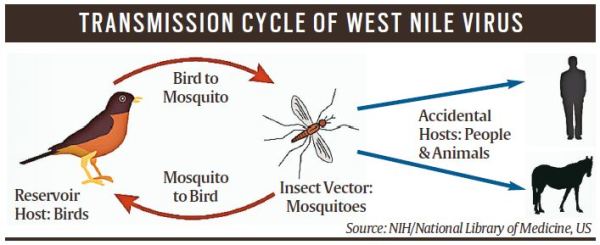Context
-
The Kerala health department is on alert after the death of a 47-year-old from Thrissur due to the West Nile Virus.
What is the West Nile Virus and how does it spread?
- The West Nile Virus is a mosquito-borne, single-stranded RNA virus.
- It is a flavivirus related to the viruses that cause St. Louis encephalitis, Japanese encephalitis, and yellow fever.
- Culex species of mosquitoes act as the principal vectors for transmission.
- It is transmitted by infected mosquitoes between and among humans and animals, including birds, which are the reservoir host of the virus.
- Mosquitoes become infected when they feed on infected birds, which circulate the virus in their blood for a few days.
- The virus eventually gets into the mosquito’s salivary glands.
- During later blood meals (when mosquitoes bite), the virus may be injected into humans and animals, where it can multiply and possibly cause illness
- WNV can also spread through blood transfusion, from an infected mother to her child, or through exposure to the virus in laboratories. It is not known to spread by contact with infected humans or animals.

Credit: Indian Express
- According to the US Centre for Disease Control and Prevention (CDC), it does not spread “through eating infected animals, including birds. Always follow instructions for fully cooking meat”.
- The CDC notes that the incubation period for WNV disease is typically 2 to 6 days, but can range from 2 to 14 days, and can be several weeks in immunocompromised people.
- To date, no human-to-human transmission of WNV through casual contact has been documented.
Symptoms of West Nile Virus
- The disease is asymptomatic in 80% of the infected people.
- The rest develop what is called the West Nile fever or severe West Nile disease.
- In these 20% cases, the symptoms include fever, headache, fatigue, body aches, nausea, rash, and swollen glands.
- Severe infection can lead to neuroinvasive disease such as West Nile encephalitis or meningitis or West Nile poliomyelitis or acute flaccid paralysis.
- WNV-associated Guillain-Barré syndrome and radiculopathy have also been reported.
- It is estimated that approximately 1 in 150 persons infected with the West Nile Virus will develop a more severe form of disease…. Recovery from severe illness might take several weeks or months.
- Some effects to the central nervous system might be permanent.
- It usually turns fatal in persons with co-morbidities and immuno-compromised persons (such as transplant patients).
Detection of West Nile Virus
- The virus was first isolated in a woman in the West Nile district of Uganda in 1937. It was identified in birds (crows and columbiformes like doves and pigeons) in the Nile delta region in 1953.
- WNV outbreak sites are found along major bird migratory routes.
- Today, the virus is found commonly in Africa, Europe, the Middle East, North America, and West Asia.
WMV in India
- In India, antibodies against WNV were first detected in humans in Mumbai in 1952 and virus activity has since been reported in southern, central, and western India.
- WNV has been isolated in India from Culex vishnui mosquitoes in Andhra Pradesh and Tamil Nadu, from Culex quinquefasciatus mosquitoes in Maharashtra, and from humans in Karnataka.
Preventive measures
- In most countries, the peak for WNV infections generally coincides with the period when mosquito vectors are most active and the ambient temperature is sufficiently high for virus multiplication.
- Since WNV outbreaks in animals precede human cases, the establishment of an active animal health surveillance system to detect new cases in birds and horses is considered essential in providing early warning for veterinary and human public health authorities.
Treatment
- No WNV-specific prophylaxis, treatment or vaccine is available.
- So, only supportive treatments are given to neuroinvasive WNV patients.
Reference:
Visit Abhiyan PEDIA (One of the Most Followed / Recommended) for UPSC Revisions: Click Here
IAS Abhiyan is now on Telegram: Click on the Below link to Join our Channels to stay Updated
IAS Abhiyan Official: Click Here to Join
For UPSC Mains Value Edition (Facts, Quotes, Best Practices, Case Studies): Click Here to Join
